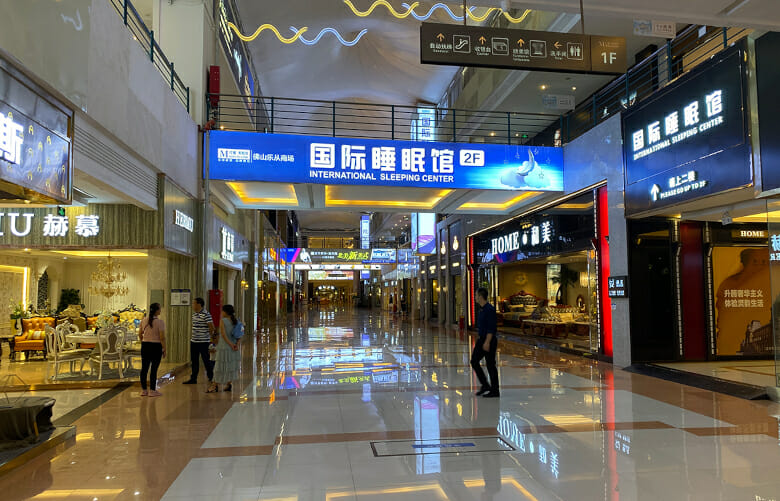
Red Star Macalline Brand Furniture Wholesale Expo Center in Foshan, Guangdong province
Less than four months after having its credit rating withdrawn by Fitch Ratings, Alibaba-backed home furnishing mall operator Red Star Macalline Group Corporation is in talks to sell what could be a controlling stake in the company to Chinese state-controlled conglomerate Xiamen C&D Inc.
According to a filing by the retail developer to the Hong Kong stock exchange on Monday, Shanghai-listed Xiamen C&D is in discussions with Red Star’s controlling shareholder, Red Star Macalline Holding Group Company, regarding a potential cash acquisition of Red Star’s Shanghai-traded A shares held by the holding group.
The transfer of this stake, which represents less than 30 percent of the Red Star’s total share capital, may result in Red Star Holding losing control of the company. Red Star, which is dual-listed on the Hong Kong and Shanghai exchanges, asked for a suspension of trading of the company’s A shares on Monday, adding that the prospective deal is still uncertain and no definitive agreement has been reached.
When Alibaba began acquiring what is now a 13 percent stake in the troubled retail real estate firm in 2019, it was pitched as a way to leverage the e-commerce giant’s tech powers in the bricks and mortar world, however, by September last year Fitch noted that Red Star Macalline Holding Group had declined to buy back two of its malls which it had placed into an asset-backed securities scheme, with the mainland holding firm facing RMB 3.5 billion in potential bond redemptions and another RMB 587 million in perpetual securities coming due before September 2023.
Betting on Offline Retail
Backed by US private equity firm Warburg Pincus until 2019, Red Star has a portfolio of 94 owned or leased shopping malls, along with 284 managed shopping malls and eight furniture malls in which the company is a joint investor, according to a recent announcement.

Alibaba’s senior leadership may have gotten their fingers burned in China’s retail sector (Getty Images)
The company saw its revenue drop by more than 7 percent in the first half of 2022 compared to a year prior amid the ongoing impact of COVID-19 and tumbling home sales in China. News of a possible investment by Xiamen C&D comes as state-owned enterprises take an increasingly active role in propping up the country’s flailing real estate firms.
Founded in 1986, Shanghai-based Red Star generates most of its revenue from rents and related income at its collection of owned or leased shopping malls, which are spread across 224 cities in 30 provinces, municipalities, and autonomous regions of China. The portfolio spans a total mall operating area of 22.3 million square metres (239.7 million square feet).
Warburg Pincus committed more than RMB 1 billion ($146 million) to the company in 2007, and over the next several years, the global growth investor worked with Red Star’s management team to expand the retail developer across China and bring in more capital partners. Red Star made its debut on the Hong Kong exchange in June 2015, raising over $1 billion, followed by a dual listing on the Shanghai bourse in January 2018.
Alibaba then bought out Warburg Pincus’ stake in May 2019 and invested another RMB 4.4 billion in convertible bonds issued by Red Star at a value equal to roughly an additional 10 percent share in the company, as part of a strategy by the online shopping behemoth to leverage its technology and cash resources in brick-and-mortar commerce.
Just months after Alibaba’s investment, Red Star decided to pursue a new challenge by launching its own real estate agency under the name Macalline Aijia, according to local media reports.
Falling Revenue
Fitch had downgraded Red Star Macalline to a “B” rating from “BB” in September of last year, citing a “weakening in the consolidated profile” of the holding group due to refinancing risks facing the company’s large bond maturities over the following 12 months.
The ratings agency also said it expected weak sales of new homes in China and COVID-related social restrictions to dampen furniture demand and snare the company’s operations. Red Star’s occupancy rate fell from 94 percent in 2021 to 92 percent in the first half of 2022, Fitch noted, but added that the company’s liquidity and access to bank financing was adequate.
Red Star reported total revenue of under RMB 7 billion in the first half of 2022, down 7.3 percent compared to the same period in 2021, according to the group’s most recent interim report. Rental and related income in its portfolio malls increased by 6 percent year-over-year, mainly because of the launch of new malls in late 2021, but income from its managed shopping malls plunged 22.7 percent.
“The decrease in revenue was primarily due to the delay in the progress of relevant services under the COVID-19 pandemic environment in the first half of the year,” the company said. Red Star’s Shanghai malls, which generate a quarter of its revenue, faced a three-month pandemic lockdown during this time.
SOE Steps in
Based in the provincial capital of Fujian, Xiamen C&D is controlled by the municipal government and specializes in supply chain operations and real estate development. The company had total assets of RMB 602 billion as of year-end 2021.
Xiamen C&D joins a string of state-run institutions that have offered a helping hand to China’s beleaguered private real estate firms over the past year. Last week, troubled developer Sunac China Holdings agreed to sell its majority stake in a massive indoor ski resort project in Shenzhen to its government-backed JV partner Zhuhai Huafa Property Development for RMB 3.6 billion.
That deal came soon after Sunac sold nearly 90 percent of its interest in a development project in Shanghai to state-owned investment firms CITIC Trust and China Huarong Asset Management for an estimated RMB 12 billion.
In November, a buyout group organized by the Shenzhen government purchased China Evergrande Group’s halted headquarters project for RMB 7.54 billion. And in September, distressed builder Shimao Group agreed to sell its stakes in two Beijing residential projects to state-owned developer China Resources Land for RMB 3.3 billion.
Leave a Reply